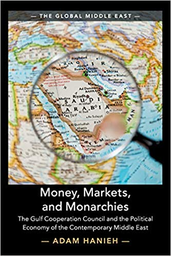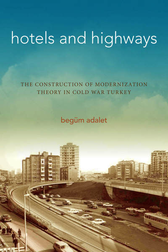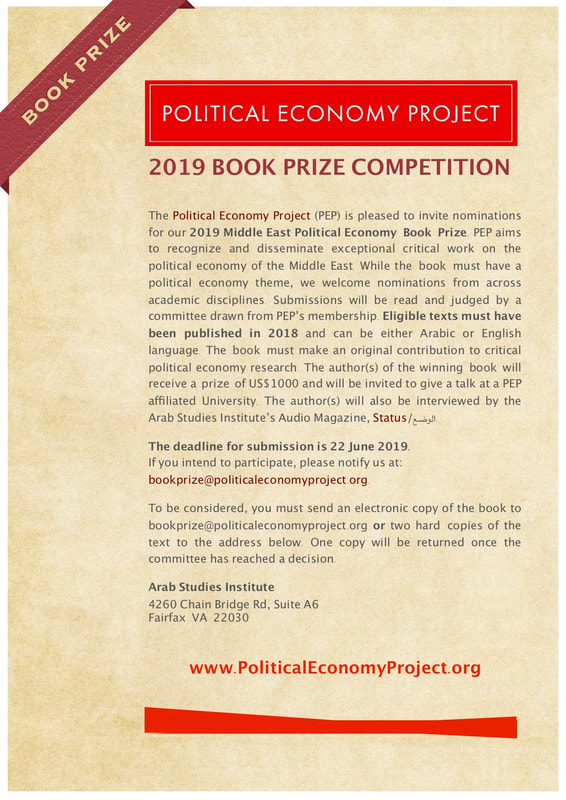Announcing the 2019 Middle East Political Economy Book Prize Winner and Honorable Mention
The Political Economy Project (PEP) is pleased to announce the results of the 2019 Middle East Political Economy Book Prize competition. With this prize, PEP aims to recognize and disseminate exceptional critical work on the political economy of the Middle East. This year marks the fourth annual award, and the selection committee reviewed nearly twenty nominations for a range of books dealing with political economy—representing a diversity of disciplines, topics, and geographic focus. The selection committee was particular impressed with two books in particular and consequently felt the need to recognize an honorable mention award.
The 2019 selection committee recognizes the following authors for their original contributions to critical political economy research:
The 2019 selection committee recognizes the following authors for their original contributions to critical political economy research:

Winner
Adam Hanieh’s Money, Markets, and Monarchies: The Gulf Cooperation Council and the Political Economy of the Contemporary Middle East (Cambridge University Press, 2018) From the 2019 Selection Committee: Adam Hanieh’s Money, Markets, and Monarchies: The Gulf Cooperation Council and the Political Economy of the Contemporary Middle East provides a way to think about the global in revolutionary ways that center Gulf flows of capital as not supplemental or secondary but central to what we know as international political economy. The text elucidates and analyzes the the ways in which Gulf-based firms are implicated in the circulation of all commodities, not just oil and gas. It also highlights the importance of taking scale seriously while also moving across its different registers. Money, Markets, and Monarchies is both theoretically informed and theory generating. Hanieh writes in prose that is engaging and accessible. The book marks a must-read contribution for specialists of Middle East political economy while also offering a valuable pedagogical resource for the classroom. For more on the book and Hanieh motivations and goals in writing it, read this New Texts Out Now interview. |

Honorable Mention
Begüm Adalet’s Hotels and Highways: The Construction of Modernization Theory in Cold War Turkey (Stanford University Press, 2018) From the 2019 Selection Committee: Begum Adalet’s Hotels and Highways: The Construction of Modernization Theory in Cold War Turkey is a thrilling work that models how to understand the epistemological force of material change. This is political economy as it should be. It gives us new ways to think about Turkey, about modernization theory, state power, affective categories, and shifting subjectivities. Hotels and Highways is a milestone achievement and will be a benchmark for scholars writing on the many topics it deals with. The field of political economy is better for it. For more on the book, read this New Texts Out Now interview. |
|
The Political Economy Project (PEP) is pleased to invite nominations for our 2019 Middle East Political Economy Book Prize. PEP aims to recognize and disseminate exceptional critical work on the political economy of the Middle East. While the book must have a political economy theme, we welcome nominations from across academic disciplines. Submissions will be read and judged by a committee drawn from PEP’s membership. Eligible texts must have been published in 2018 and can be either Arabic or English language. The book must make an original contribution to critical political economy research. The author(s) of the winning book will receive a prize of US$1000 and will be invited to give a talk at a PEP affiliated University. The author(s) will also be interviewed by the Arab Studies Institute’s Audio Magazine, Status/الوضع.
The deadline for submission is 22 June 2019. If you intend to participate, please notify us at: bookprize@politicaleconomyproject.org. To be considered, you must send an electronic copy of the book to bookprize@politicaleconomyproject.org or two hard copies of the text to the address below. One copy will be returned once the committee has reached a decision. Arab Studies Institute 4260 Chain Bridge Rd, Suite A6 Fairfax VA 22030 politicaleconomyproject.org |



